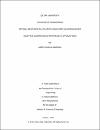| المرشد | Mohamed, Amr Mahmoud Salem |
| المؤلف | Al-Marridi, Abeer Ziad |
| تاريخ الإتاحة | 2019-09-11T11:35:44Z |
| تاريخ النشر | 2018-01 |
| معرّف المصادر الموحد | http://hdl.handle.net/10576/11818 |
| الملخص | In the last few years the number of patients with chronic diseases that require constant monitoring increases rapidly; which motivates the researchers to develop scalable remote health applications. Nevertheless, transmitting big real-time data through a dynamic network limited by the bandwidth, end-to-end delay and transmission energy; will be an obstacle against having an efficient transmission of the data. The problem can be resolved by applying data reduction techniques on the vital signs at the transmitter side and reconstructing the data at the receiver side (i.e. the m-Health center). However, a new problem will be introduced which is the ability to receive the vital signs at the server side with an acceptable distortion rate (i.e. deformation of vital signs because of inefficient data reduction).
In this thesis, we integrate efficient data reduction with wireless networking to deliver an adaptive compression with an acceptable distortion, while reacting to the wireless network dynamics such as channel fading and user mobility. A Deep Learning (DL) approach was used to implement an adaptive compression technique to compress and reconstruct the vital signs in general and specifically the Electroencephalogram Signal (EEG) with the minimum distortion. Then, a resource allocation framework was introduced to minimize the transmission energy along with the distortion of the reconstructed signal |
| اللغة | en |
| الموضوع | Deep Learning-Based - Mhealth Applications
|
| العنوان | Optimal Resource Allocation Using Deep Learning-Based Adaptive Compression For Mhealth Applications |
| النوع | Master Thesis |
| التخصص | Computing |
|
dc.accessType
| Open Access |


